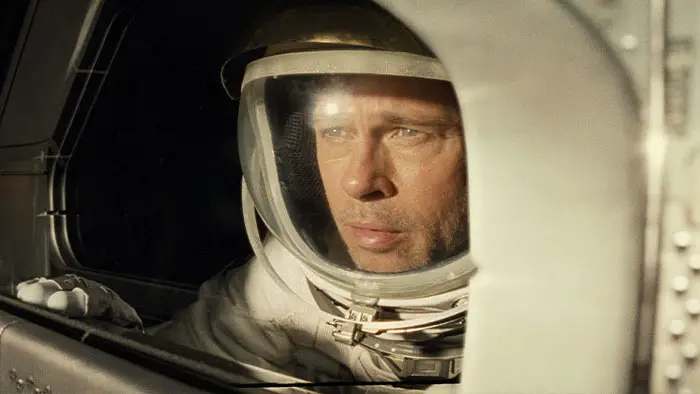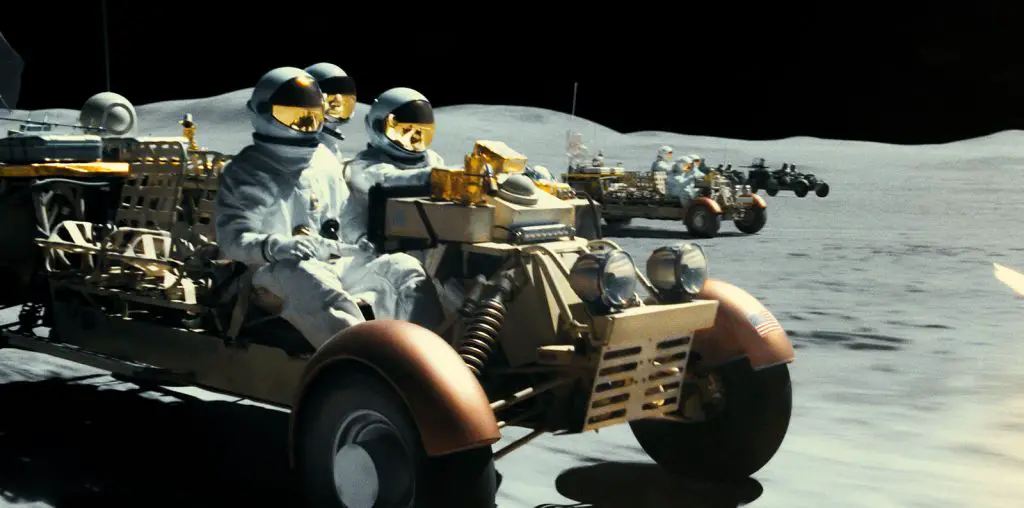
It is a real shame because Ad Astra does have some great individual scenes. But the plot is set in motion by nonsense, and the characters go act stupidly and ruin everything. Why have towers that extend into space when radio waves penetrate the atmosphere? Why go to Neptune to search for life around other stars when it is no closer and the magnetic field of the sun doesn’t interfere with instruments anyway. Why pull a gun on a spaceship when you know a bullet through the hull will kill everyone? Why has the inciting incident been an “antimatter chain reaction” that threatens all life in the solar system when this is nonsense and the stakes are supposed to be personal anyway? And why sneak onboard a spacecraft when you know this will doom people to death if they run out of supplies or fuel? You can’t stay in a movie like that and take the drama or themes seriously if they are so contrived, with such disdain for the intelligence of the audience.

“We’re in a wondrous age where you can put things on screen that we’ve never seen before, so blaze a trail like a real astronaut would.”
Good science advisors don’t just help you with the science, they help ground the plot and characters, allowing you to reach even farther. And they give you a fresh perspective beyond the Hollywood drama school myopia and groupthink. But more than that, if you’ve got all your space knowledge from other science fiction, you’re dooming yourself to being derivative. Space is wilder than anything we’ve ever seen on screen, but I’ve never seen a movie brave enough to show it in all its alienating beauty and insanity.
Here’s how to fix Ad Astra in a single paragraph. Make the towers space elevators, and have them come crashing down — better spectacle and it ties in with the tower of Babel and the hubris of over-striving. Make Tommy Lee Jones an explorer, not someone obsessed with life. History is filled with people more obsessed with the new frontiers than their families. Get rid of the nonsense antimatter chain reaction, and have Tommy Lee Jones’ own failings be the motivation for stopping him. Make the ship accident a fire instead of a shootout. It would look cooler on screen — spherical fire(!), and it says something about overheated passions in the world of space travel where a cool head prevails. And most of all, don’t try to ape 2001. We’re in a wondrous age where you can put things on screen that we’ve never seen before, so blaze a trail as a real astronaut would. We’ve now got astounding knowledge of Jupiter and its moons, full of chemical volcanoes and underground oceans. Saturn has satellite worlds with ice geysers and ethane lakes. And Neptune’s moon Triton is like a real-life Hoth, only it is an ancient captured comet, with Neptune looming large in the sky. Instead of having them whiz by on-screen like afterthoughts, take us to these places, full of novel drama. Even if what you’re trying to highlight is human folly, give is a little of the awe and mystery of these harsh otherworldly frontiers. Show us the true nature of space, which is every bit as terrifying and wonderful as the human soul.


I found the premise that the anti-matter beams were focused on earth ridiculous. If this was really a problem, wouldn’t TLJones have self-destructed or at least sent a warning to earth about the problem. If the anti-matter was the propulsion system of the Neptune mission, wouldn’t TLJones try to continue the mission to the stars after he killed the rest of the crew? This doesn’t seem to be in the plot. The data that is passed on to Brad Pitt seems very brief and inconclusive: Images of planets are not enough- what about traces of life, even microbial? What about a human compatible planet? Are they only looking for intelligent life, instead of ANY extraterrestrial life? Here’s a better ending: the destruction of the Neptune ship causes a mini-black hole or space-worm that sucks Brad Pitt outward at near light speed. Thus, he becomes the real star explorer and will try to reach the next planet, though probably to never return. This was sort of the ending of Mission to Mars, where Gary Sinese decides to ride the free trip to the alien destination, rather than return to earth. Don’t know if the science was any good on that film, but I found it much more satisfying. Remember the madness of the remaining astronaut on Mars who was surviving on growing plants (Don Cheadle)? That was a great scene which showed the fragility of human nature on another planet.